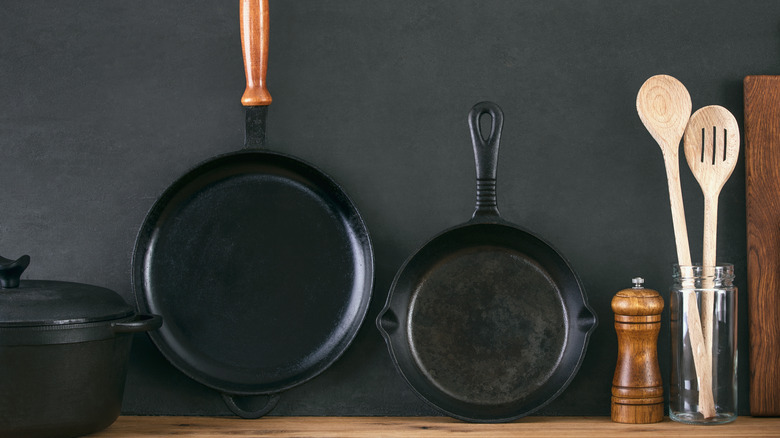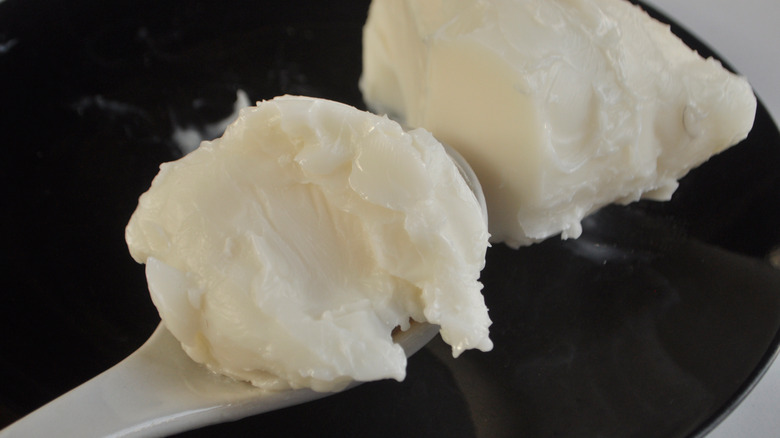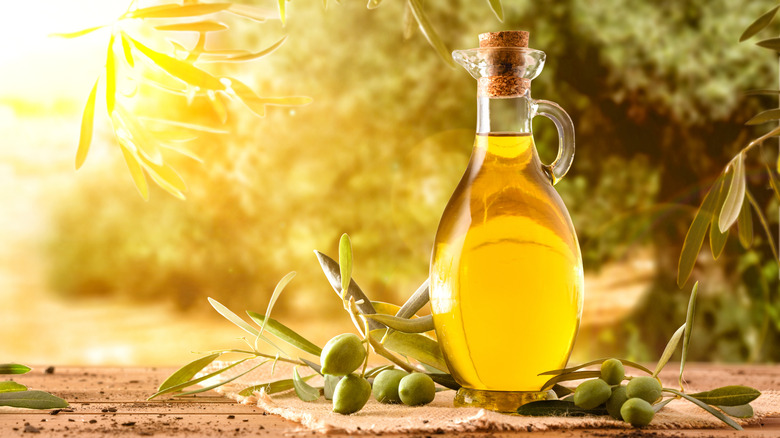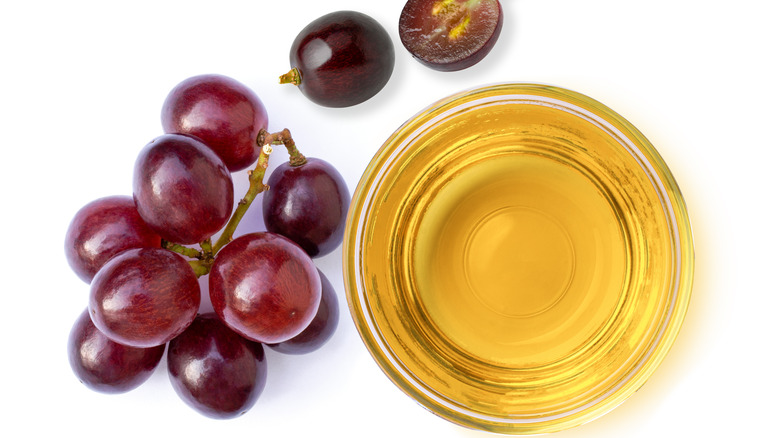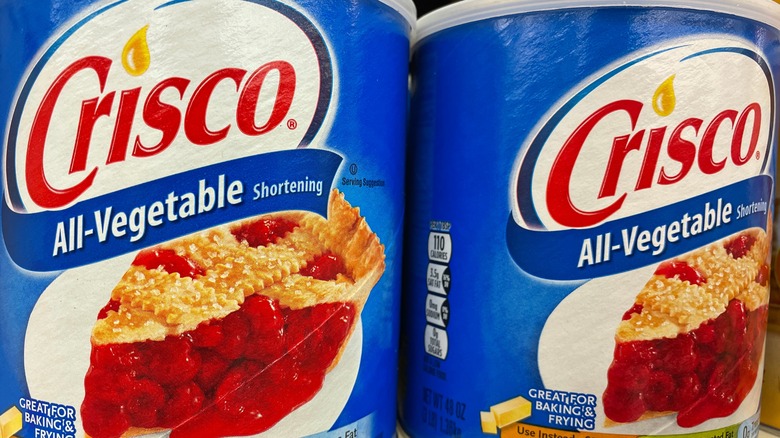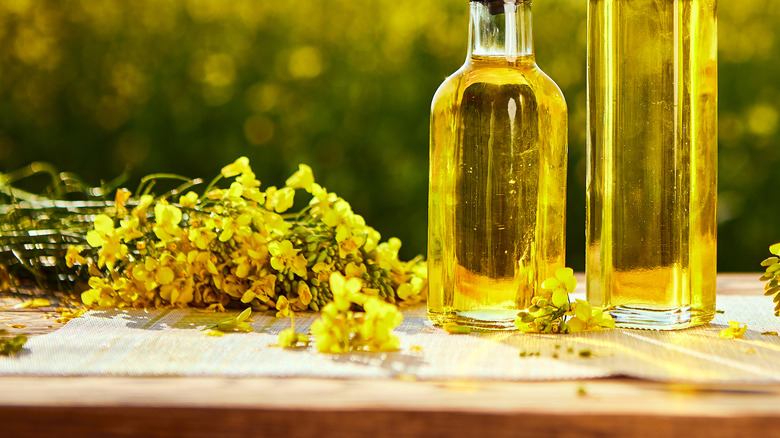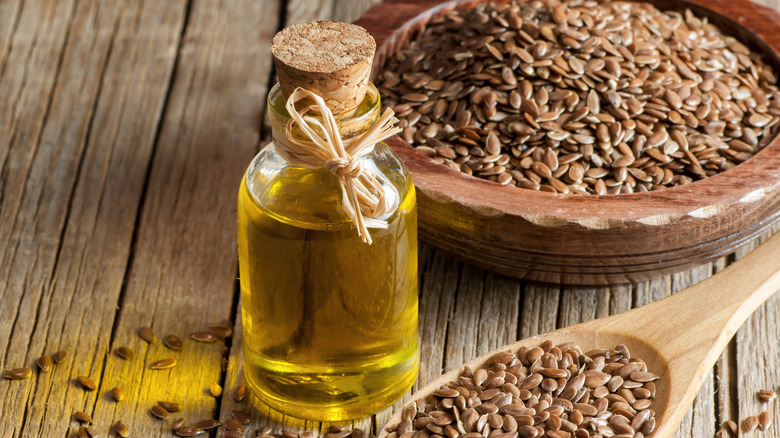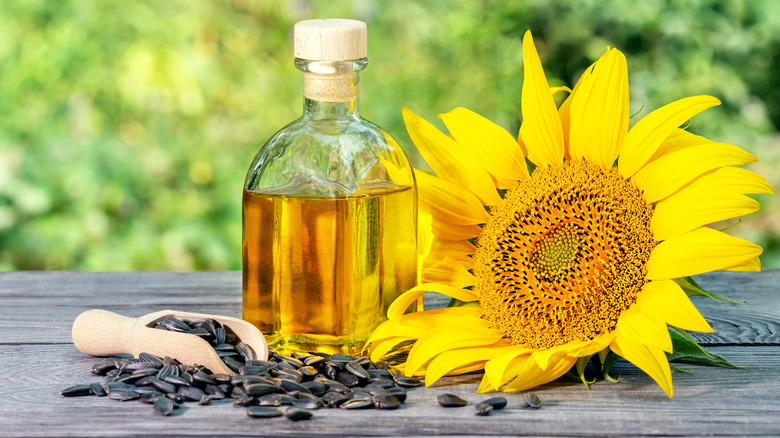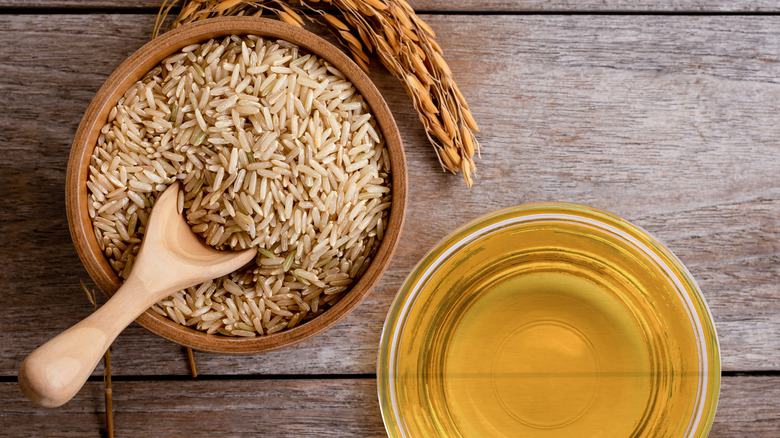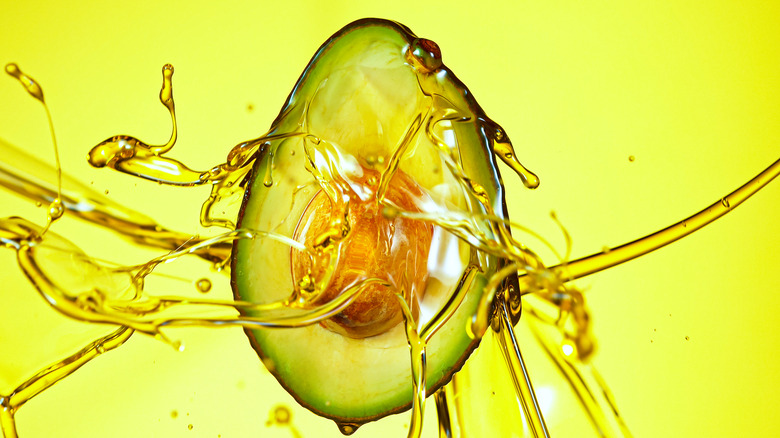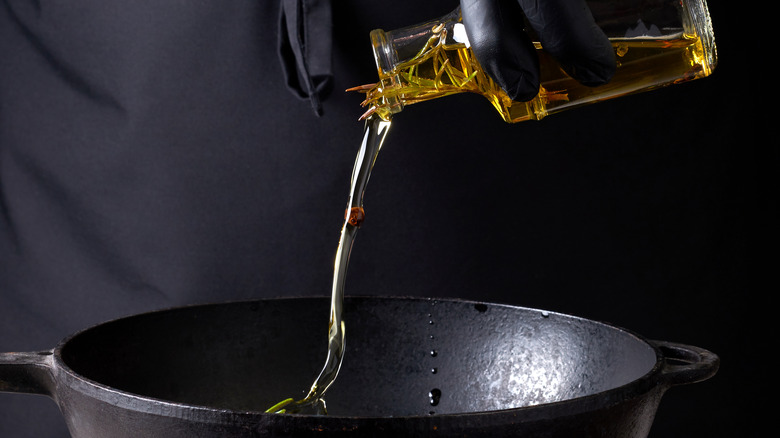The Best Oils To Use With Your Cast Iron Pan
There's a reason cast iron pans have been around for literal generations. These prized kitchen implements are often passed down through the family. Cast iron can last practically forever, and pans made from the stuff are basically indestructible. You can use cast iron on the stovetop or in the oven. A good cast iron skillet fries, bakes, sautés, braises, stews, and more, provided you take care of it the right way.
Part of that care includes properly seasoning your pan. This means heating a cooking oil to its smoke point (the temperature at which the oil begins to smoke) so that the fatty acids in oils reorganize into a layer of molecules that give the pan its shiny, nonstick surface. That surface is called seasoning. Since part of reseasoning a cast iron skillet involves heating the oiled pan for a long time in a very hot oven (450 to 500 F) and then repeating the process several times, an oil with a high smoke point is your best bet. Too high, and you won't polymerize — too low, and your neighbors might think to call the fire department when the smoke alarm starts blaring.
Keeping your pan oiled after each use keeps building up and maintaining that nonstick surface. In fact, it gets a little bit better and better each time. Read on for the best oils to use with your cast iron pan.
Lard
Lard is simply rendered pork fat, explains Prevention. It's not bacon grease, which retains a salty, smoky flavor. Instead, lard has very little flavor and a smoke point of 375 F.
Traditionally, lard was the fat of choice for seasoning cast irons for generations. However, people stopped buying lard for several reasons. As the WebstaurantStore writes, lard descended out of common use once hydrogenated vegetable shortening (more on that later) became widely available. But, despite the availability of vegetable oil, you can't keep a good pig product down. NPR once reported that lard was making a big comeback, and these days, it's now available fresh or shelf-stable.
Since lard has a lower smoke point than some oils, it's important to check your cast iron pan regularly if you use lard to season or cook with. If you notice that your pan has a sour smell, chances are the lard has gone rancid. Clean the pan and reseason it (you should reseason your cast iron pans a few times a year anyway). If you are someone who uses their cast iron pan very regularly, consider using this old favorite.
Vegetable/Soybean Oil
Surprise! There's not really a thing called vegetable oil, at least not when it comes to cooking oils. Most types of cooking oil labeled as vegetable oil are actually derived from soybeans. Per the Iowa City Press-Citizen, the majority of vegetable oil made in the United States is truly soybean oil in disguise.
According to 2021 statistics, soybean is the most widely consumed oil in the United States. Made from soybeans, which the journal of Abiotic and Biotic Stresses in Soybean Production lists as an important worldwide crop, the oil is used for packaged foods, dressings, sauces, and more. It's also a good choice for seasoning your cast iron pan.
Refined soybean oil has a smoke point of 450 F (via Healthline). As such, pure soybean oil is a good choice for seasoning as it can stand up to the high temperatures needed to create polymerization. It's important to figure out if your vegetable oil is actually a blend, however, as this might change the smoke point. Additionally, soybean oil has a neutral flavor, so it won't impart any flavor to the foods you cook in your pan. Can It Go Bad? writes that, like most vegetable oils, soybean oil will last about six months after it has been opened. It should always be tightly sealed and stored in a cool, dark place.
Olive Oil
Chances are you have a bottle of olive oil in your home. It's a household staple, used in cooking, dressings, and sauces. According to the North American Olive Oil Association, refined olive oil (which includes light olive oil) has moderate to high smoke points, ranging from 390 F to 470 F. Extra virgin olive oil also has more of a variable smoke point, ranging from low temperatures 350 F to higher temperatures at 410 F. The difference depends on the amount of free fatty acids found in your olive oil of choice.
Depending on what type of olive oil you select for seasoning, it might impart some flavor to the foods you are cooking. Light olive oil has almost no flavor. Extra virgin has a mild flavor, which is why many people like cooking with it. In fact, it's considered a good all-purpose oil for cooking by chefs. Using olive oil to season your cast iron is an option, but some sources say you might want to think twice about seasoning your cast iron with olive oil. The reason for this is that an olive oil seasoning layer might degrade faster than other oils, requiring you to repeat the seasoning process sooner than expected.
Grapeseed Oil
Grapeseed oil is another oil that you may already have in your house. This oil is actually a by-product of the wine-making process when leftover grape seeds are pressed so that oil can be extracted. While it is commonly used as a beauty and skincare product, there are an abundance of reasons you should consider cooking with grapeseed oil more often, including the especially high stability and smoke point.
The smoke point of grapeseed oil is 450 F. Artisanal and specially crafted grape seed oils can have a slight flavor and smell, but most of the time, this oil has a neutral taste. As such, it's unlikely to impart flavors when used as a seasoning oil for your cast iron. Plus, WebMD writes that grapeseed oil is one of the more nutritious oils; it contains omega-6 fatty acids and is high in both vitamin E (a powerful antioxidant) and polyunsaturated fats. Grapeseed oil is generally available cold-pressed or expeller-pressed; either option is good for seasoning.
Be sure to store it correctly, reminds LeafTV. An opened but tightly sealed bottle of grapeseed oil can last up to six months in a cool, dark cabinet or up to one year in a refrigerator.
Shortening
Like Xerox and Band-Aids, shortening is known to most people by a brand name: Crisco. Many people bake with shortening, though it can also work for cast iron seasoning. This seasoning oil is essentially any fat that is solid at room temperature. Technically, shortening would include butter, but many people don't count butter as shortening. Butter has water content, while shortening is 100% fat.
Oklahoma State University explains that shortening can be made from vegetables or animal fat. There is also a shortening mix of hard fats (solid) and vegetable oils (liquid). Vegetable shortening has a moderate smoke point of 360 F and can be found readily available in tubs or sticks, like butter.
Shortening is white in color and neutral in flavor. It is relatively shelf-stable and doesn't need to be refrigerated. We recommend this kind of oil for cast iron specifically because it's relatively inexpensive and, because of its semi-solid consistency, is easy to apply.
Like most oils, shortening should be kept in a cool, dark place. FoodKeeper, an app from the Federal Drug Administration, says that shortening can last for up to two years unopened. Once opened, you've got six months to a year to use it all up.
Canola Oil
Time for another good seasoning oil you may already have in your kitchen — canola oil! This product is made from canola, a flowering plant that produces seed pods. The seed pods are harvested and crushed to release the oil.
Canola oil is considered heart-healthy by the American Heart Association because it is lower in saturated fats than other oils commonly used in the United States. However, per the Harvard School of Public Health, canola oil has a high content of unsaturated fats. This is what makes the oil so good for cast iron seasoning. As the American Chemical Society writes, unsaturated fats are a lot more reactive to heat and so easily form the polymer bonds that make the nonstick layer of your cast iron.
Canola oil is great to have on hand and is ideal for seasoning for a few reasons. It has a smoke point of 400 F, according to Avante-Garde Kitchen. It's affordable oil and very versatile. Plus, it has a neutral taste, so it won't impart any flavor if you use it for seasoning. Does It Go Bad writes that canola oil lasts for about one year once opened.
Flaxseed Oil
Flaxseed oil has been around for a long time. It comes from flax, which, according to the Cleveland Clinic, is one of the oldest crops in the world. Archeologists can date the use of flax to around 30,000 years ago, and the see has many functions, including as clothing fibers, industrial uses (where it is sometimes called linseed oil), and cooking. In particular, most home cooks have gotten hip on using flaxseed oil to season, and the reasons might be surprising.
Remember reading that a high smoke point is your best bet for seasoning cast iron? Well, this is one of the exceptions. Comparatively, flaxseed oil has a low smoke point of 225 F. So how can that be good for cast iron? Science, that's how! According to the Encyclopedia of Applied Plant Sciences, flaxseed (linseed) oil is a drying oil. Chemically, drying oils are more susceptible to bonding due to having a high content of unsaturated fats, which is true of flaxseed oil. Despite the low smoke point of flaxseed oil, the composition allows for polymerization to happen quickly and to form a glassy seasoning layer.
While flaxseed oil has been popular as a seasoning agent in recent years, some communities are beginning to point out that layers built with flaxseed oil aren't as durable as others. Still, the chemical properties make a good case for giving this oil a try. When you note that flaxseed oil can be expensive, other options might be best.
Sunflower Oil
Sunflowers are one of the most recognizable flowers. They grow tall and produce large flowers with lots of edible seeds in the center — up to 1000 per flower, according to Shelling Machine. Those seeds are what make sunflower oil.
Sunflower oil is on the list of the American Heart Association's healthy cooking oils. It's a good source of vitamins E and K and is low in saturated fats. It's high in two healthy fats, polyunsaturated and monounsaturated, which can help reduce bad cholesterol, triglycerides, and the risk of heart disease — as well as form strong seasoning polymer bonds.
When it comes to cooking and seasoning, sunflower oil is a good choice. Be aware that it comes in two forms: refined and cold-pressed. Refined is the kind you want for seasoning because of its mild flavor. That means coating your cast iron with it won't affect the flavor of your food. Cold-pressed has a nuttier flavor, so keep that in mind when deciding which oil will work best for what you are cooking. The smoke point of refined sunflower oil is high, at 450 F, according to NBC News. It's best to refrigerate cooking oils with a high content of unsaturated fats, like that of sunflower.
Rice Bran Oil
Good for you, and good for cooking and seasoning? That's rice bran oil, according to WebMD. Made from the exterior hull or bran of rice, called chaff, rice bran oil is very popular in Asian countries and cuisine. It has a high smoke point, making it one of the best oils for seasoning a wok, which explains its popularity in the East. It's a healthy oil loaded with tocopherols (a type of vitamin E) and good fats. Rice bran oil can help lower cholesterol and blood pressure and manage blood sugar.
The smoke point of rice bran oil is 450 F (via Rice Science). Unrefined rice bran oil does have a slightly sweet and nutty flavor, per Masterclass, so keep that in mind when seasoning or cooking with your cast iron. Rice bran oil has a long shelf life, according to a report by Technavio Market Research, published in Business Insider. Best kept in the refrigerator, the oil can last up to two years, making it a seasoning tool that you can purchase once and think of only when you need it.
Safflower Oil
Safflower oil is another one you may have heard about in recent years. That's probably because of its nutritional benefits. WebMD says that safflower oil contains nearly 75% linoleic acid, which is known to help lower cholesterol levels and help your heart and circulatory system perform better. Several scientific papers available on Science Direct agree, mentioning its potential abilities to reduce the risk of heart disease and health problems associated with Type 2 Diabetes.
It's also good for your cast iron. Like most of the other oils in this article, safflower oil is a high smoke point oil at over 400 F, according to Canadian newspaper The Globe and The Mail. It has a neutral taste, making it useful for all kinds of cooking since it won't impart any additional flavor to your food from the coating. But it's important to store it the right way. Oxidation can cause safflower oil to turn rancid, so unopened bottles need to be kept away from light and heat (via VeryWell Fit). Once opened, it's best to store it in the refrigerator, where it will last for up to six months.
Avocado Oil
Avocado oil is a relative newcomer to the culinary world, but it's still an excellent choice. It has a lot of nutritional benefits, including improved hair and skin health and lower blood pressure and cholesterol. For these reasons (and many more), the American Heart Association also considers it a healthy cooking oil.
Avocado oil is produced from the flesh of the fruit and not the seed, which makes it somewhat unique when it comes to cooking oils. The oil is a dark color and contains monounsaturated fats, which are good fats (via Healthline). As the American Chemical Society asserts, unsaturated fats are adept at forming strong polymer bonds when put under heat — but that's only one of the reasons it is such a good seasoning oil.
Avocado oil is great for sautéing, but in creating a cast iron cover, it shines. The smoke point of 520 F means that you can turn up the heat to generate polymerization without your oil sounding the alarm. However, avocado oil does have a taste ranging from buttery to nutty, so keep that in mind when using it to season cast iron.
Since avocado oil is high in oleic acid, it keeps for a while. The website Still Tasty recommends around eight months if you are storing it in the refrigerator. Don't worry if it goes a bit cloudy when stored in your fridge. It will go back to normal once it reaches room temperature.
The Best Oil for Seasoning Cast Iron
So what is the best oil for seasoning cast iron? Well, it turns out there isn't just one "best." But certain things make some oils better choices than others (though all the ones in this list will work just fine).
With the possible exception of flaxseed oil, among the absolute best type of oil for seasoning cast iron are those with high smoke points and a significant amount of unsaturated fats. These are your best bet for coating and maintaining your cast iron pans. They are also often more economical, easy to find, and might already be in your kitchen. When it comes to cooking, you can use these or any other kind of oil that the recipe requires. So season away and enjoy cooking. There are great tips for cast iron skillets out there, and you'll quickly learn how versatile and easy it is to cook with these longtime kitchen favorites.
